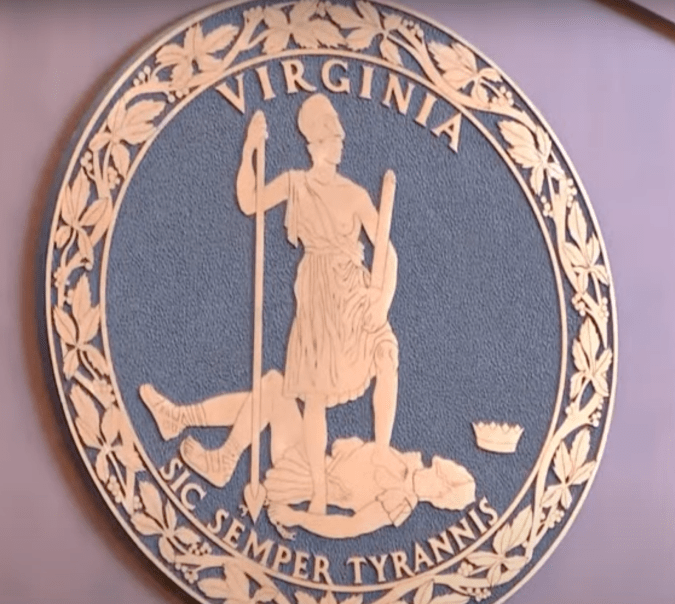Seconds after John Wilkes Booth shot Abraham Lincoln at Ford’s Theatre, the actor made a 12-foot leap from the president’s balcony down to the stage, fracturing his leg in the process. Despite the pain, he followed his plan by raising his knife into the air and shouting, “Sic Semper Tyrannis!” (Latin for Thus Always to Tyrants!) Then he managed to escape the theatre and the District of Columbia, fleeing into Virginia on horseback.
Sic Semper Tyrannis was the famous line Brutus was supposed to have uttered at Julius Caesar’s assassination. But I had no idea until today–when I was definitely not watching a clip of the Johnny Depp/Amber Heard trial–that it is also the state motto for Virginia.

Virginia State Seal
I recognized the phrase because of John Wilkes Booth, who I knew was a Shakespearean actor. Booth’s actions in the theatre after he shot Lincoln always struck me as a pretentious stunt, performed for the benefit of a few actors and scholars who would recognize the phrase. I imagined it was a kind of Inside Baseball reference, intended for and understood by a select few. Knowing that it is Virginia’s state motto forces me to reconsider.
With a few notable exceptions, (I hear you, New York and Texas) people tend to think more in terms of regions than states. It’s more common to hear someone refer to midwesterners than to Ohioans, for instance. In 1865, people identified more strongly with their states. That was partly because state governments were far more powerful back then.
The founders recognized that the views of Americans varied widely according to the states where they lived. People tend to settle in places where they had shared views with their neighbors. And the views of New Hampshire tended to be very different than the views of Georgia. Recognizing the futility of legislating in a way that worked equally well for all states–or attempting to impose one state’s values on the others–the founders determined that most things–from education to business regulations to public safety–should be decided at the state level. A decentralized structure was more democratic, and gave individuals more power over their daily lives. They created a federal government too, but they were careful to limit their power to specific responsibilities, such as printing money, delivering the mail, and national defense.
In 1865, the federal government had a minimal role in the lives of American citizens but as time goes on, it has taken on many of the powers designated to the states. Even relatively small issues that were once decided at the state level, such as the minimum age for purchasing alcohol, are now decided by Congress, the U.S. Supreme Court, and/or a presidential executive order.
Virginia adopted Sic Semper Tyrannis as their motto in 1776, the year the colonies declared their independence from England. Nearly a century passed before John Wilkes Booth shot the president and shouted that phrase in Ford’s Theatre.

Ford’s Theatre
Like most Americans, I learned of Lincoln’s assassination when I was a child in school and Booth was presented as a one-dimensional villain. But it’s better, isn’t it, if we understand why Booth did what he did?
I may be giving him too much credit but perhaps his dramatic final appearance was more than the actor attempting to create narrative by uttering a memorable phrase. Maybe he was more genuine in his beliefs. Maybe his last public statement was an attempt to communicate with Virginians with an allusion to their shared history and values–and what he believed to be their shared view of Lincoln as a tyrant.
See the comments for a link to the series I wrote about what is known of the final days of John Wilkes Booth and the mysteries about him that persist to this day!
LikeLike